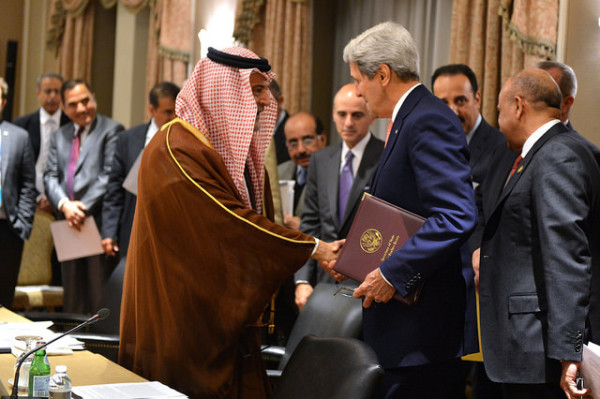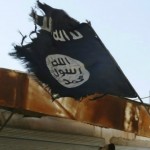by Mark N. Katz
The states of the Gulf Cooperation Council (GCC)—Saudi Arabia, Kuwait, Bahrain, Qatar, the United Arab Emirates (UAE) and Oman—are frustrated. Four of them—Saudi Arabia, Kuwait, Qatar and the UAE—have vast quantities of petroleum. All of them are monarchies. And all of them are militarily weak. Thus, ever since the Cold War (and even before the formation of the GCC in 1981), the states that formed the GCC have looked to the United States for protection.
Yet the states of the GCC believe they have good reason to fear for their security. Their rival, Iran, is actively supporting Shia allies in Iraq, Syria, Lebanon, and Yemen. In addition, while the Sunni-jihadist Islamic State (ISIS or IS) is virulently anti-Shia and anti-Iranian, it could soon pose a security threat to Saudi Arabia and other GCC states if it is not contained.
The GCC’s fear that Washington is not as strongly committed to its security as it was in the past was heightened by the Obama administration’s withdrawal of American forces from Iraq in 2011 and its unwillingness to take military action against the Iranian-backed Assad regime in Syria last year. While the GCC states welcome (and some have even joined) the US-led bombing campaign against IS, they fear that it will not suffice to stop the group, much less defeat it.
The GCC states also fear that what they see as decreased American interest in their security does not just reflect the Obama administration’s policy, but that it will also be the policy of subsequent administrations—Republican or Democrat. They fear that the North American “shale revolution” that has resulted in greatly increased American oil production is leading to a perception in Washington that the US and its Western allies are no longer so dependent on Gulf petroleum, and thus the security of these states will become a less vital concern for the United States. In addition, they worry that if the Obama administration’s efforts to improve US-Iranian relations prove successful, the resulting expanding business ties between the two countries would lead to future administrations giving less priority to Gulf Arab concerns about Iran.
The views of the GCC states on security matters, it must be noted, are not completely uniform. Oman, unlike the others, has relatively good relations with Iran. And Qatar, unlike the others, supported Egypt’s Muslim Brotherhood-led government—which Doha saw as moderate but the others regarded as extremist—before its ouster by the Egyptian military in 2013. All the GCC governments, though, have relied on the US as their primary protector up to now. So they are all frustrated by what they see as declining American interest in helping them.
As a result, some voices in the Gulf have called for the GCC to turn to other powers for support. The European Union, Russia, China, and India have all been mentioned. It is not clear, though, that any of them are willing or able to play this role. The recent French intervention in Mali notwithstanding, the EU states do not seem willing to act as defenders of the GCC without American leadership—or perhaps even with it.
Russia would like to play a more active role in GCC security, but is not willing to sacrifice its close ties to Iran (or Israel) for the sake of the GCC. Nor does Moscow have the desire to engage in sustained military activity outside the former Soviet Union. Ukraine is a higher priority for it anyway.
While China and India have become more assertive in their immediate neighborhoods, both appear to prefer that America continue to protect the GCC states, which supply them with oil, rather than undertaking this expensive task themselves. And there are no other candidates besides the EU, Russia, China, and India that could conceivably replace the US as the primary great power protector for the GCC.
Some in the GCC, though, do not appear to recognize this. Others do, but seem to hope that talking about turning to other great powers might motivate Washington to do more for the Gulf for fear of losing influence there to a rival. There is also very little appreciation, or even tolerance for the idea that an Iranian-American rapprochement could actually benefit the GCC through the increasing American ability to moderate Iranian behavior by offering Tehran carrots instead of just wielding sticks.
Whether the Obama administration’s hopes for an Iranian-American rapprochement will come to fruition, of course, is highly uncertain. But even if they do, neither Europe, Russia, China, nor India will react by scaling back their own ties to Iran in order to supplant American influence in the GCC. Nor will any of them act more forcefully than the US against the threat posed by the Islamic State. Thus, however frustrated the GCC states might be with Washington, they have little choice but to rely upon it for protection.






“[all of them] have vast quantities of petroleum. All of them are monarchies. And all of them are militarily weak.”
And yet they engage in dangerous, subversive activities in the other countries of their region in order to reshape the regimes to their own liking, and in the process financing and propping up Talibans, Al Qaeda and ISIS, elements who could and I believe will some day turn on them. These regimes feel insecure, and they completely rely on the U.S. for having their backs. They want to act like heavy hitters on the world stage without having the real muscle, experience, know-how to back it. They come across as spoiled, pampered children from affluent neighborhoods who keep venturing into poor, rough neighborhoods to rumble with big and bad bullies, they get scared and they run crying to their parents that the bullies don’t respect or fear them. You can buy western technology and big weapons but you can’t buy respect or fear. It’s a strange, surrealistic scene, and yet it’s a behavior that our administrations seem to tolerate and encourage. Nobody has told these regimes to behave and clean up their own badly neglected countries instead of messing up others. If these monarchies were good at nation building they wouldn’t have such exclusionary, undemocratic systems because they are so afraid of losing control to their citizens. On the day that their oil runs out or a better, cheaper energy resource becomes available these regimes are instantly toast. Even without those possibilities these regimes are highly vulnerable to the wrath of their own citizens as well as blowback from the jihadi movements they have instigated themselves.
GCC should ask Iran to protect them
Perhaps it’s time to make peace with Iran, 100%, with the populations within their own countries. Or perhaps they could turn to Israel as a protector, considering that today, thanks to the U.S.A., Israel is the “superpower” of the M.E. Oh well, just a thought to this thorn in the side of the peoples of the M.E. I suppose there is a third way, biologically doing away with all war mongering, but that would eliminate all the profit making of the arms manufactures, and we all know that they won’t stand for that.
RonH , I agree with you. Then there is a question. Why are the GCC pampering and spoiling their youth instead of training them to build a serious army to defend the countries.
One wonders why Kuwait after having been invaded by Iraq have not thought of such long time solution. I think the reason they don’t do that, is that they know that when they will send these young people to war , their own legitimacy will be put into question and that could provoke a possible military coup and social unrest that may bring them down.
They much prefer to pay mercenaries from powerful country and in exchange buy from them billions of dollars of military equipment rotting in warehouses.
Now that they have adventured in intervening in less rich Arab countries, they are more exposed to the consequences and they are far from ready for that.
Now the USA doesn’t want anymore to be their mercenaries and the GCC is looking for candidates, one of them has been ISIS and Al Nusra , but both turned greedy. Who else will prostitute to protect the GCC family regimes?
Virgile, you’re right on all the points and questions you raise. To those I add, these countries were not really natural creations. The people do not have a national identity. In some of those countries large groups of people don’t even do an honest day’s of work and rely on foreign labor to run everything from offices to their homes for them. They have an ethnic and religious identity which lends itself to the kind of tribalism that has kept them disunited. With rare exceptions (which can be highly caveated) they do not have a history or tradition of fighting for their national identity or independence. They did not EARN their countries. They were part of the Ottoman empire for centuries (and other empires prior to that) and never developed that sense and pride of national identity. Then along came European colonial powers who simply carved them out of the Ottoman empire based on random borders that served some short term goal and just handed these countries to some tribal leader who had promised to maintain allegiance. And voila, new monarchies just arose out of nothing with no work done! Where other monarchies can at least make some legitimate claim to the throne based on the military triumphs of themselves or their grand daddies, these new monarchs are really paper monarchs. They can carry daggers and swords like they are some kind of a famed warrior but I can guarantee you that those swords are made in Hong Kong and if they were ever used it was for cutting watermelon, not in battle. So the predominant aspect of their nationhood is really of a vassal nature. A people that’s not actively or even historically vested in its own independence turns to the kind of dependency on foreign powers and neighborhood mercenaries that we see there today. The population is kept rather docile and at bay, and anyone who exhibits unruly or fighting symptoms is manipulated and indirectly encouraged to channel that fighting spirit outside of the country toward some obscure purpose such as the laughable prospect of “an international califate”. For the West to throw its lot in with such parasitical ruling families it’s asking for nothing but trouble, and as we have all witnessed, that’s all it has got. Now, oil companies and arms dealers is a separate matter.